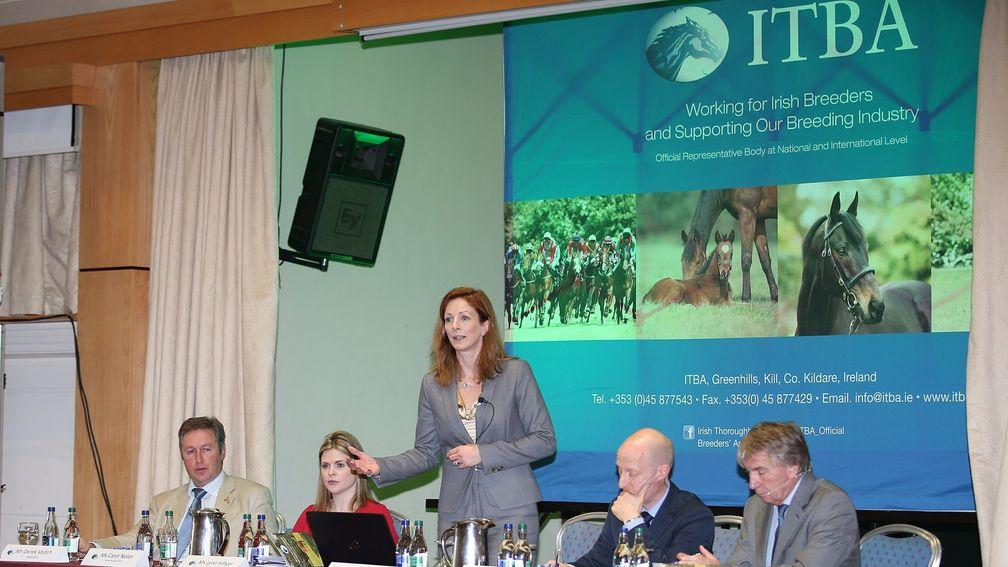Testing measures in place for excessive cobalt levels

The Turf Club's head of anti-doping Dr Lynn Hillyer has confirmed that the regulator is now utilising a foreign lab to test for excessive cobalt levels.
A controversial performance-enhancing substance that Hillyer describes as a "serious issue" when deployed for the purposes of cheating, cobalt was revealed by the Racing Post last September as not being tested for in Irish racing.
It is naturally-occurring in small doses in healthy horses, a trace mineral found in B vitamins that can be legitimately supplemented without any rule infringement.
Excessive cobalt was already being tested for in other major racing nations, and the issue has re-emerged after the supplement Hemo 15 was among five unauthorised substances found in the jeep of veterinary surgeon Tim Brennan at Willie Mullins' yard in February 2015.
Brennan appeared before Kilkenny District Court last week and will do so again on April 25, having been charged with 14 offences following a joint Department of Agriculture and Turf Club inspection at Closutton. According to the charge sheet, he did not possess the necessary prescriptions for the substances.
Hemo 15 contains cobalt. Although it can be legitimately used in Ireland if the proper procedures are followed for importing it, a new Turf Club advisory notes: "Registered injectable cobalt supplements such as Hemo 15 and Hemoplex offer no nutritional advantages because incorporation of cobalt into the vitamin B12 molecule
occurs within the horse’s gut."
Similar to the well-known blood doping agent EPO, cobalt can increase red blood cells, which improves metabolic efficiency.
The Turf Club chief executive Denis Egan has stated that there is no suggestion of any wrongdoing by Mullins, who has so far chosen not to comment on the case.
The other unauthorised substances listed on Brennan's charge sheet were a painkiller called P-Block, an anti-inflammatory called Cortalone, quinidine sulfate - which is used to treat irregular heartbeats - and Catosal.
Catosal is also used to tackle deficiencies in vitamin B12, which contains cobalt.
Speaking on Thursday, Hillyer revealed the Turf Club has established a procedure via an International Federation of Horseracing Authorities-certified lab to screen for excessive cobalt.
"Cobalt is a serious issue," she stated. "Whether it is or isn't a problem, I don't know. We've no evidence it is at the moment, but we've been testing for it since the end of last year.
"We're still working with our own laboratory on the provision of a specific instrument for cobalt testing. That's an active process, but cobalt is being tested for it regularly.
"I have put steps in place to make sure we are. At the moment we're relying on external laboratory services to do this, and it's not just one or two samples, it's a significant proportion of samples."
Of Hemo 15 specifically, Hillyer added: "Hemo 15 is a regularly-used medication. It is used as a straightforward multivitamin prep, but it has cobalt in there as well as a number of other vitamins and elements.
"It can be licenced in Ireland if it's brought in with the right veterinary prescription and paperwork. It's not registered for use in Ireland but vets can bring it in and use it perfectly legally."
Because cobalt is naturally occurring and can be legitimately supplemented, levels and procedures have taken time to agree internationally.
Hillyer revealed she now has an advisory document ready to distribute to trainers and put on the Turf Club website following the publication of internationally-established thresholds in this week's racing calendar. She also confirmed that more out-of-competition testing is taking place.
"It's important to make clear what could and couldn't be done," she said. "We've increased out-of-competition testing and stable inspections, which is effectively an audit. We've been doing two, three or four a week, and that will continue."
Published on 6 April 2017inNews
Last updated 17:08, 6 April 2017
- Merci Olivier! No final winner for Olivier Peslier but the world of racing unites in saluting the end of a great career
- The latest edition of the Racing Post is available to read online now - here's how you can access it
- How Smart View recorded a 76 per cent profit at the Cheltenham Festival
- Smart View is available on the Racing Post app - how to read the revolutionary new racecard
- Levy reform talks 'accelerating' as clock ticks down to April deadline for agreement
- Merci Olivier! No final winner for Olivier Peslier but the world of racing unites in saluting the end of a great career
- The latest edition of the Racing Post is available to read online now - here's how you can access it
- How Smart View recorded a 76 per cent profit at the Cheltenham Festival
- Smart View is available on the Racing Post app - how to read the revolutionary new racecard
- Levy reform talks 'accelerating' as clock ticks down to April deadline for agreement